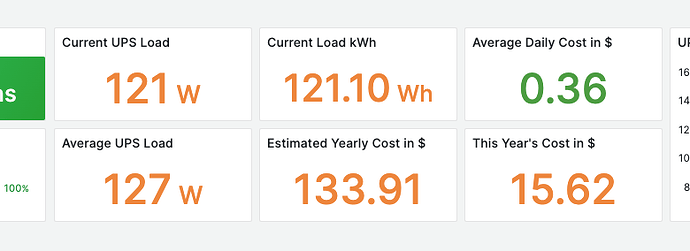Please drop the cheap agressive rhetorics. We're not in any kind of pissing contest here.
a setup with 14x 16TB Disks which would consume around 70W-100W in idle
Not sure where you're getting this data, but here's mine, with references:
- 5400 RPM HDD idle power usage: 0.18W (7200 Vs 5400 RPM - Which One is Better? - Tech News Today), so 14*0.18= 2.52W total (probably with the disks getting into auto-sleep, but that's how they should be most of the time anyway).
- N100-based Mini PC (like the one I pointed) idle power usage: 14.3W total (Beelink EQ12 Review - An Intel Processor N100 mini PC tested with Windows 11, TrueNAS, pfSense, Ubuntu, and more - CNX Software)
- Let's throw 12W more for the 2 USB HUBs, HDD power supply inefficiencies, etc.
So, about 2.52+14.3+12= 28.82W total. Let's round it up to a nice 30W.
In the US the current electricity price is around 19cent per kwh, which would be basically only 150usd per year for the elecricity - even in the US.
Again not sure where you got this data; US DoE official data says it's just 16.3 cents average: Electric Power Monthly - U.S. Energy Information Administration (EIA)
And for the record, my friend (in whose house I plan on setting up my remote storage) lives in WA (which is not even the cheapest state electricity-wise) and pays less than 9 cents per kWh (I've seen his latest bill) .
What you are saying is that you can have electricity + internet for 284usd per year? 24usd per month? really?
Nope, i do not believe that.
Believe what you want, but I included URLs for all my data (which BTW you didn't), and here's my estimated total annual electricity cost: 365.25 days (the .25 is to account for leap years) * 24 hours * 30/1000 kW = 262.98KWh; 262.98 Kwh * $0.09/kWh = $23.66. And that is per year. So yeah, less than $2/month.
I would say the remaining 284/12-2= $21.66 per month ought to be enough to upgrade my friend's internet, given that a full 50Mbps DSL costs under $30/month over there (https://www.allconnect.com/local/wa), and once my data is loaded on these drives (which is not going to be done over the internet), 50Mbps is way more than I need.
By the way, you are paying for the time it takes to maintenance everything as well. if something is failing, it can be very time consuming.
Maintenance in this case is disconnecting the cables from the failed HDD (or, worst-case, the mini-PC), placing it in a box, slapping a shipping label on it, and dropping it at your nearest USPS/UPS/whatever. When the replacement hardware arrives, just revert the exact same procedure; all of this is done without using a single tool, opening up a single case/cabinet, or taking out a single screw. Where's the "very time-consuming" in that?
You could maybe compare it if you would buy serious server hardware, but you will need to pay a lot more if you like to have 14 SAS/SATA Ports.
and comparing a mini PC with 14 usb harddrives to a real cloud storage with 10k SAS drives is some kind of a joke.
The joke would be to use 10K SAS drives for an application that would never demand more than 100MB/s (which is the maximum capacity of a 1Gbps fiber-to-the-home connection), and the setup I proposed can sustain at least twice that under sequential access. Likewise "serious server hardware" where a mini PC will suffice and in spades.
That said, please feel free to live in as expensive a place as you want, and spend as much as you want on overpriced and overspecced hardware -- it's your money, after all. But please respect the folks that, like me, would rather be frugal and spend only what's necessary.
